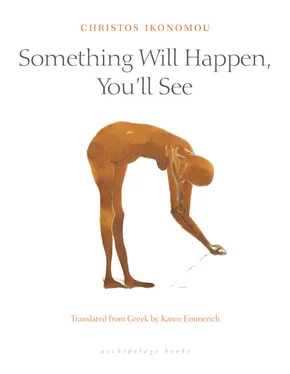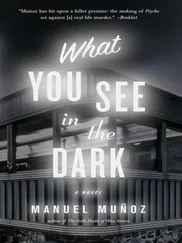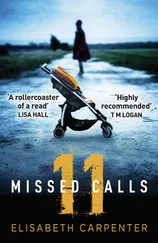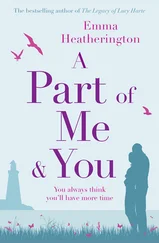He remembered something that had happened the previous October when they were still living in their old place. It was Sunday evening, outside it was rainy and windy. He was lying on the sofa and listening to the rain and feeling the spot on his chest where the doctor had shaved off a patch of his hair. The doctor had shaved him and put on some doodad with suction cups that was supposed to monitor his heart rate. On Wednesday he’d fainted at the store just like that for no reason. Lena took him straight to a cardiologist. Blood pressure meter, cardiograph, echocardiogram. The guy poked and prodded for an hour. Are you experiencing any kind of stress, he asked and Vassilis said no but it wasn’t true. They were out of money again — Lena’s sister had some kind of debts and wouldn’t be able to pay them until the end of the month. And they were down to their last hundred euros.
Cut back on coffee and cigarettes and alcohol, the doctor told him. And salt. And start walking. And make an appointment to come back for a stress test. I don’t see anything serious but the older we get, the more the old ticker needs looking after.
The cardiologist charged seventy euros. Fifty for the office visit and twenty for the machine.
He was still listening to the rain and rubbing his chest where the doctor had shaved him when Lena bent over him and kissed him on the ear. Wake up, she said. Get up, I have a surprise for you. She took his hand and put her other hand over his eyes and pulled him into the kitchen. For a moment — who knows why — he thought that he would open his eyes and see a pile of money spread out on the kitchen counter. When he opened his eyes he saw a plate of cookies.
Ta-da! Lena cried and laughed and clapped her hands. What do you think? You’re going to love them. You’ve never tasted cookies like this before, believe me. Don’t try them yet, I’m going to make some hot cocoa first. Your little Lena sure can cook sometimes, these are real gourmet treats.
She made the hot cocoa and lit some candles and put 16 Horsepower on the stereo and opened the balcony door. They sat on the sofa and ate cookies made with grape must and drank cocoa listening to music, watching the rain and smelling the wet earth. The cookies were crunchy, with sesame and cinnamon.
There’s nothing I’m afraid of right now, said Lena. She looked him in the eye. I’m not worried about work or money. Nothing. I’m not even afraid of illness. Really. I don’t know why, I just have this faith inside. I believe in Christ. I believe in us. There’s nothing else I need. Nothing.
He started to say something but she stopped him.
Shut up, she said, and take me to bed.
• • •
It was nighttime when Lena called. What’s wrong, she asked. Why do you sound like that? He told her he’d been sleeping and she woke him up. He told her he was going back to bed and they’d talk in the morning. Then he went into the kitchen and turned on the oven to heat up his dinner. Lena had made goat with potatoes. He ate straight out of the pan like an animal, with his hands. He was hungry. He ate half the pan and drank another bottle of tsikoudia — his third that day. When he opened the fridge to take out the bottle he looked at the empty shelves and the frozen white light coming out of the fridge. The cold hit his face. He felt as if he had opened the door of some strange foreign world that was ready to suck him up. He closed the door of the fridge and held it shut with both hands.
Then he left the house.
He went down Kidonia Street and crossed over into the square and then out onto Halidon Street and headed down to the port. He turned right onto a sidestreet and ducked into a bar called Labyrinth. He hadn’t been there in years. The bartender was different. The music was different. The people were different — now it was full of queers in shorts with gel in their hair. He looked at the women. They all looked pregnant. Fat and pale and sweaty. He felt like throwing up. He ran back outside. He bought cigarettes and more tsikoudia from a minimarket on the corner and headed on foot for Souda Bay. His boots slapped heavily against the pavement. He wore boots year round, winter and summer, had ever since he was in school. He liked the smell of the leather, the sound the heels made, the feeling of security on his feet. He felt as if he were wearing armor. He hated normal shoes, thought it shameful for a man to let his socks show. Though recently Lena had been pressuring him to wear sneakers in summer. You’re going to mess up your feet if you don’t let them breathe, she said.
Outside the schools in Koumbes he tripped over a broken sidewalk tile and almost fell. His right boot got scratched. He bent over and rubbed it with his hands, stroking the stiff black leather.
No, he said. No way. As long as I live I’ll always wear boots. End of story.
And he was glad he’d finally found something to demand.
• • •
When the house burned down Lena was twelve weeks pregnant.
He didn’t see anything or hear anything either. But he could smell the burn from the next street over. And when he turned the corner he saw a crowd gathered outside the house. Someone ran toward him shouting his name and grabbed him by the shoulders. He saw the door of the house which had been busted open, and the blackened walls, the street full of water. The window of the bookstore was in ruins. They made him sit down on the steps of the house across the street and brought him water. Everyone was talking at once. A fire. The oven was on. The fire department. We were looking for you. That’s what he remembers. And he remembers an old woman splashing his face with water and rubbing his cheeks hard, and his forehead and neck and crying and saying oh that poor unlucky girl.
The same words, again and again.
Oh that poor unlucky girl. That poor unlucky girl. That poor unlucky girl.
• • •
Talking to Lena so she’ll fall asleep or so she’ll stay awake. It depends. But talking. All night every night. Until his voice in the dark of the bedroom starts to sound like it’s not his voice but just a sound in the night, a sound that belongs to the night. All night every night. In the morning he steals time from work and searches the internet or flips through American almanacs in search of evidence and facts and numbers. He prepares himself as best he can for the night because at night he has to talk to Lena — he can’t let her down, can’t let her go hungry. Because Lena is hungry. And the night is hungry. And Vassilis feeds them both with useless things, with trivia — facts, evidence, numbers — because if he doesn’t feed them they’ll eat him instead. So each night he talks and talks and talks until his mouth goes dry and each day he hopes for just a single night when he can go to sleep quietly, to fall asleep just once without talking without dreams without worries.
Tonight he talks again to Lena about the mysteries of the human body and of sleep and dreams.
And then he tells her about Dr. Cohen’s rabbits.
At an international conference on longevity in Melbourne, Australian professor of alternative medicine Mark Cohen announced that the rabbits he and his team pet every day at the lab live sixty percent longer than the rabbits they don’t pet.
Lena stirs a little and murmurs something then stops. It must be a dream, Vassilis thinks and counts to three, since the average dream lasts between two and three seconds. But it might also be the cold. It’s been almost a month that the heat’s been turned off. The whole apartment building ran out of petrol, the tenants don’t have money to pay the monthly fees. For the past month the tenants have all been squabbling. Apartment buildings. Cold, damp, paper-thin walls. Walls that might as well be paper. Noise from people during the day noise from things at night. Doors closing, taps running, televisions on full blast. Noise. An endless hum in the night. In the other house it was different. The other house was a house with everything a house should have. And now it’s gone. But he doesn’t talk about that to Lena. He doesn’t say anything about the house that was lost or the job that was lost or the life that was lost.
Читать дальше












